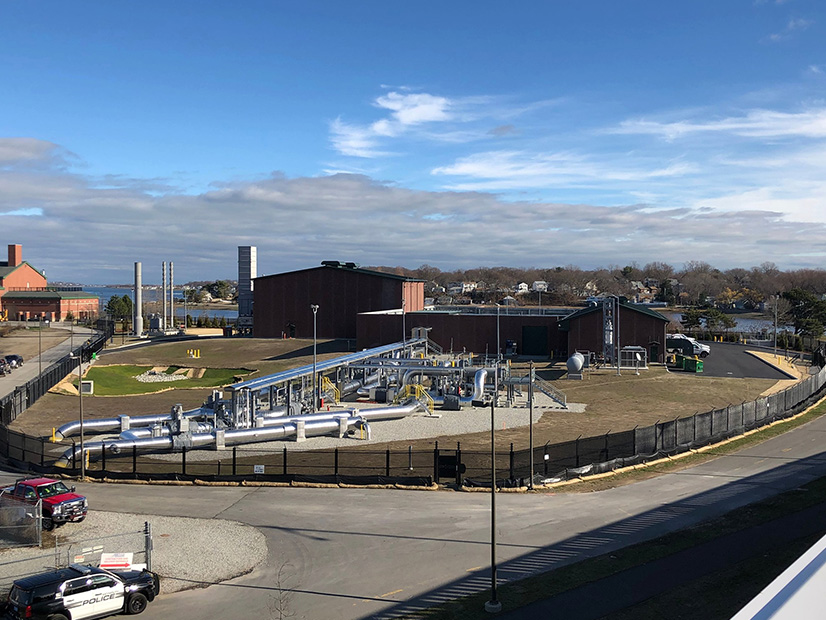
A group of Massachusetts municipalities, together with climate and health activist groups, argued in the First Circuit U.S. Court of Appeals on Tuesday that Enbridge’s calculations in support of using a gas turbine to power the Weymouth Natural Gas Compressor Station are based on outdated and unreliable information.
The municipalities and community groups suing Enbridge and the Massachusetts Department of Environmental Protection (DEP) say the natural gas distribution company and government agency showed negligence in their use and approval of the gas turbine.
The attorney representing the petitioners, Michael Hayden, said the cost effectiveness threshold from the DEP that Enbridge used to verify the economic feasibility of the gas turbine over an electric motor needs to be updated.
For nitrogen oxide (NOx), guidance from DEP on best available control technology (BACT) — a pollution control method under the U.S. Clean Air Act — says technologies in or below the range of $11,000 to $13,000/ton of NOx removed per year are considered cost effective. That range, however, is from 1990.
An expert among the petitioners investigated the manufacturer specifications of an electric motor option, as well as worst case emissions scenarios under low temperatures, low load and start up and shutdown conditions, and recommended an updated cost effectiveness threshold of $20,350 to $24,050, Hayden said.
The DEP has acknowledged in the past that the range needs to be updated but has not yet updated it, making the range from the 1990s part of the rulemaking process for projects such as the Weymouth Compressor station.
In the final decision on remand, DEP hearing officer Jane Rothchild recommended updating the dollar amounts used for the cost effectiveness determinations to reflect a cost range that accounts for inflation since 1990.
Enbridge previously argued before the DEP that installing an electric motor drive would be too expensive, due to the cost of electricity.
And the department’s cost effectiveness calculation “excluded more than $12 million in capital infrastructure costs needed to run the electric motor at the site,” the attorney for the DEP, Seth Schofield, argued before the court. Yet the DEP still calculated the average cost effectiveness of an electric motor is $192,500/ton of NOx, exceeding by a “dramatic margin” the performance cost effectiveness range, Schofield said.
Residents near the compression station, however, say the infrastructure costs are a price Enbridge can afford to pay.
Gas-fired engines are often used to run compressors, but methane emissions can result from the engine, incomplete combustion or system interruptions, according to the U.S. Department of Environmental Protection (EPA). The agency also says that installing electric motors in the place of gas-fired turbines decreases gas losses, limiting pollution.
Electric motors also reduce the chance of methane leaking from a compressor station because they do not use fuel gas. They require less maintenance and are more efficient than gas turbines, according to the EPA.
The federal agency reported methane savings ranging from 40,000 to 16 million cubic feet/year with electric motors.
The Weymouth Compressor station has shut down four times since it began operating last year, resulting in the emergency release of at least 300,000 standard cubic feet of gas. In another incident on May 26, Enbridge vented 11,397 cubic feet of gas in a controlled release, according to the company’s reporting to DEP.
“Given that they went $82 million over budget to fight to place [the compressor station] in our neighborhood, and now they will be spending tens of millions to dig it back up because they ‘forgot’ to put in safety measures that could’ve been put in when they were constructing, we just don’t understand what a measly $13 million is [to Enbridge],” the grassroots organization Fore River Residents Against the Compressor Station wrote on its Facebook page.
The material used to build the pipeline corrodes in salt water, so the pipe — the length of 400 football fields — will need to be dug up again for reinforcement.
The petitioners argue it was an “abuse of discretion for the department not to revisit the cost effectiveness range between the June 2019 recommended final decision, when it was first put on notice that the range is outdated, and the remand procedure where the range remains outdated and unreliable,” Hayden argued.
Last year, DEP revised its decision on the BACT based on evidence presented by Enbridge. Towns around the project and several concerned residents challenged the decision in a remand adjudicatory hearing presided over by Rothchild, who found DEP properly conducted its analysis and approved the air permit.
A state air permit for a compressor station in Virginia was thrown out in federal court because regulators didn’t consider an alternative electric compressor that would reduce air pollution from the facility.
The court wrote in its decision that “environmental justice is not merely a box to be checked, and the board’s failure to consider the disproportionate impact on those closest to the compressor station resulted in a flawed analysis.”
Last year, the Massachusetts Attorney General’s office submitted a brief to the Department of Public Utilities stating that the Weymouth Compressor station is not in the public interest, so the department should deny the company’s petition for approval because the costs of the compressor station are passed off to ratepayers.
Quincy, Braintree and Hingham, Mass., along with 10 individual citizens, first filed the petition for review of the final decision after remand about the Weymouth Compressor motor in the First Circuit U.S. Court of Appeals in February (City of Quincy, et al. v. Massachusetts Department of Environmental Protection).


